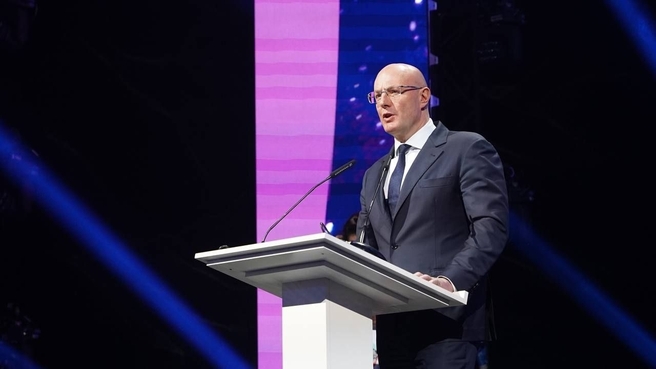
Dmitry Chernyshenko takes part in the ceremony to award the UNESCO-Russia Mendeleev International Prize
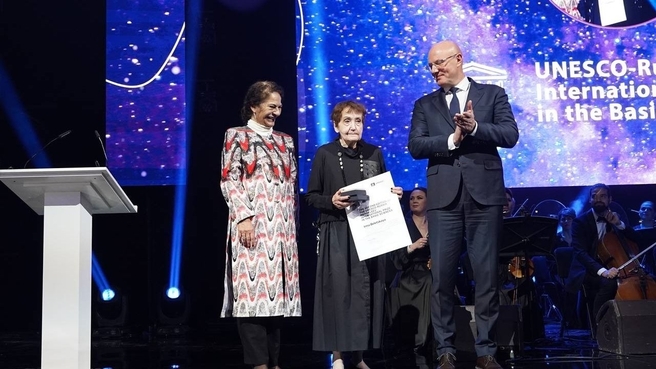
Dmitry Chernyshenko takes part in the ceremony to award the UNESCO-Russia Mendeleev International Prize. With Professor, Head of the Laboratory of Organoelement Compounds, Chemistry Department, Lomonosov Moscow State University Academician Irina Beletskaya, and UNESCO Assistant Director-General for Natural Sciences Lidia Arthur Brito
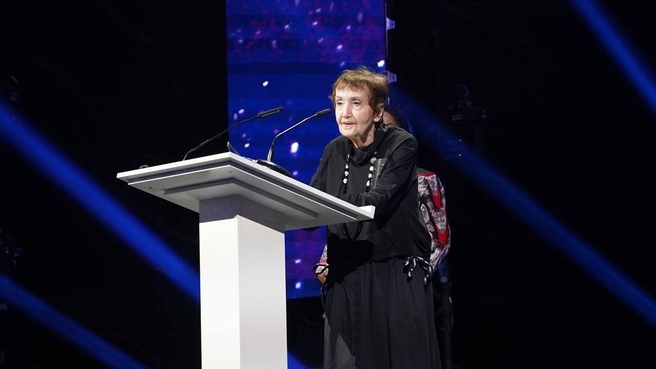
Dmitry Chernyshenko takes part in the ceremony to award the UNESCO-Russia Mendeleev International Prize. On the rostrum, Professor, Head of the Laboratory of Organoelement Compounds, Chemistry Department, Lomonosov Moscow State University Academician Irina Beletskaya
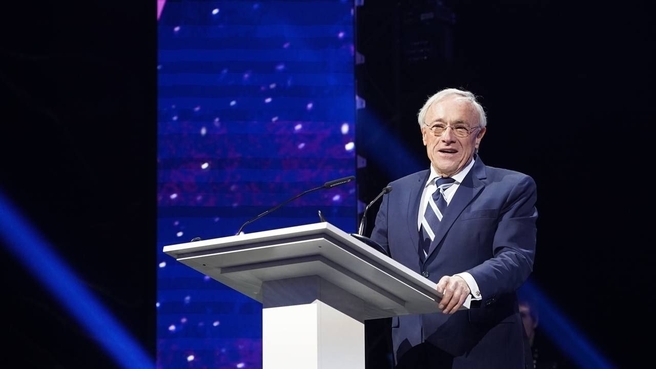
Dmitry Chernyshenko takes part in the ceremony to award the UNESCO-Russia Mendeleev International Prize. Director Emeritus of the Max Planck Institute for Polymer Research in Mainz, Germany, Klaus Alexander Mullen
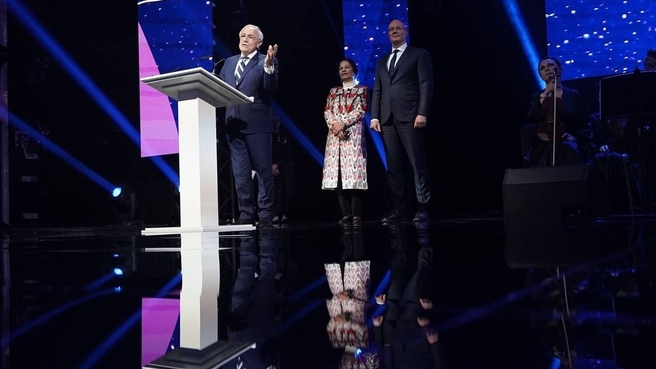
Dmitry Chernyshenko takes part in the ceremony to award the UNESCO-Russia Mendeleev International Prize. Director Emeritus of the Max Planck Institute for Polymer Research in Mainz, Germany, Klaus Alexander Mullen
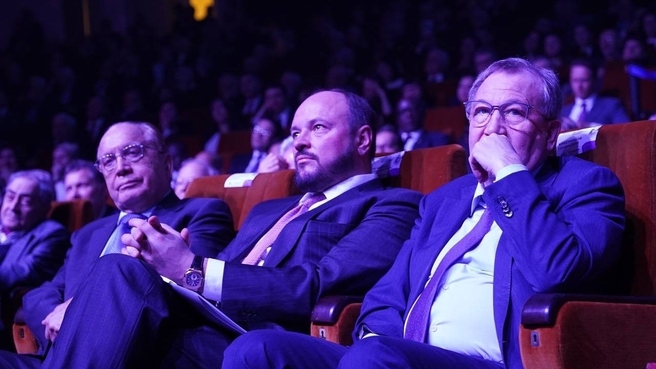
Dmitry Chernyshenko takes part in the ceremony to award the UNESCO-Russia Mendeleev International Prize. The ceremony was also attended by President of the Russian Academy of Sciences Gennady Krasnikov (far right), President of the Russian Association of Fertiliser Producers Andrei Guryev and Rector of Moscow State University Viktor Sadovnichy (far left)
Dmitry Chernyshenko takes part in the ceremony to award the UNESCO-Russia Mendeleev International Prize
Dmitry Chernyshenko takes part in the ceremony to award the UNESCO-Russia Mendeleev International Prize
Dmitry Chernyshenko took part in the ceremony to award the UNESCO-Russia Mendeleev International Prize. The prize was established in 2019 and is awarded in recognition of achievements in the basic sciences. The ceremony took place at the presidium of the Russian Academy of Sciences.
“I am convinced that research and education must transcend political expediency and remain one of the outstanding manifestations of humanism,” the Deputy Prime Minister said. “Amid international turbulence, it is particularly important to preserve and expand existing international ties and relations, and to join efforts in addressing issues that are crucial for humanity. We welcome and support all efforts aimed at fostering international scientific, technological, and educational cooperation.”
Russia remains open to the world of science, as the prize clearly shows. The award ceremony is broadcast in several languages, and representatives from nearly 50 countries and 26 ambassadors attended it. The jury includes distinguished scientists from around the world.
“I would like to thank everyone who has participated and is participating in the efforts to support the UNESCO International Prize. The prize in fundamental sciences is an important component of the constructive international dialogue in the professional community, as well as the dialogue between peoples and countries,” Dmitry Chernyshenko said.
The ceremony was also attended by Assistant Director-General of UNESCO for Natural Sciences Lidia Arthur Brito, President of the Russian Academy of Sciences Gennady Krasnikov, Russian Minister of Science and Higher Education Valery Falkov, and Rector of Moscow State University Viktor Sadovnichy.
“I am honoured and privileged to join you in presenting the second UNESCO-Russia Prize in the Basic Sciences,” Lidia Arthur Brito said during the ceremony. “This is the only global prize that rewards scientists working in fundamental sciences for projects that foster sustainable development. UN Secretary-General Antonio Guterres has repeatedly stated that sustainable development is not just one of the UN goals, but also represents hopes, dreams, rights, and expectations worldwide. And science is a key factor in implementing the agenda of the 21st century.”
This year, the prize went to two outstanding contemporary chemists, namely, Professor, Head of the Laboratory of Organoelement Compounds, Chemistry Department, Lomonosov Moscow State University Academician Irina Beletskaya, and Director Emeritus of the Max Planck Institute for Polymer Research in Mainz, Germany, Klaus Alexander Mullen. Each laureate will receive a monetary reward in the amount of $250,000, a gold medal, and a special diploma.
“On behalf of all organic chemists, I would like to thank the Mendeleev International Prize jury, because I see this award as a symbol of international recognition of organic chemistry,” Academician Irina Beletskaya said. “Organic chemistry is the key to environmentally safe production, affordable and effective medicine, and innovative materials. Each new reaction can improve our world. But such discoveries do not occur out of nowhere. They require persistent efforts over many years by thousands and thousands of organic chemists. My award represents gratitude to these people.”
The prize is awarded annually to two natural science community members in recognition of their contributions to science. The decision to award the prize was made upon recommendation of the international jury, which includes scientists with a global reputation: Eugenio Coronado Miralles (Spain), Martin Moeller (Germany), Grigory Trubnikov (Russia), Ana Maria Cetto Kramis (Mexico), Krishna Nagappa Ganesh (India), Samia Charfi Kaddur (Tunisia), and Tebello Nyokong (South Africa).
“This is a high honour for many years of scientific work and brilliant scientific results,” President of the Russian Academy of Sciences Gennady Krasnikov said. “It is particularly gratifying to see the ceremony take place at the Russian Academy of Sciences in the run-up to its 300th anniversary. This is an international-level event attesting the importance of the Academy of Sciences as a platform for humanitarian cooperation.”
Rector of Lomonosov Moscow State University Viktor Sadovnichy highlighted the importance of the prize and the contribution made by the laureates to fundamental science.
“Russia’s leading university fully supports the choice made by the members of the UNESCO international jury, which awarded the Mendeleev Prize this year to our professor Irina Beletskaya and outstanding German chemist Klaus Mullen. This is the best proof that genuine science truly knows no boundaries, and the international community of scientists continues to be a bearer not only of fundamental knowledge but also of universal human values such as solidarity, progress, and humanism. The broad international recognition of the UNESCO-Russia Prize for achievements in natural sciences once again confirms the unwavering high standing of Russian science and Russian scientists, who continue the work of Lomonosov and Mendeleev. This is a great gift to Moscow University on the eve of its 270th anniversary, and an inspiring example for young scientists,” Viktor Sadovnichy said.
The prize is presented by the Director-General of UNESCO or his representative to the two laureates during an official ceremony hosted alternately by the UNESCO headquarters in Paris and in Russia.
The first prize was awarded in 2021 at the UNESCO headquarters in Paris to Russian scientist Yury Oganesian and Italian chemist Vincenzo Balzani.






